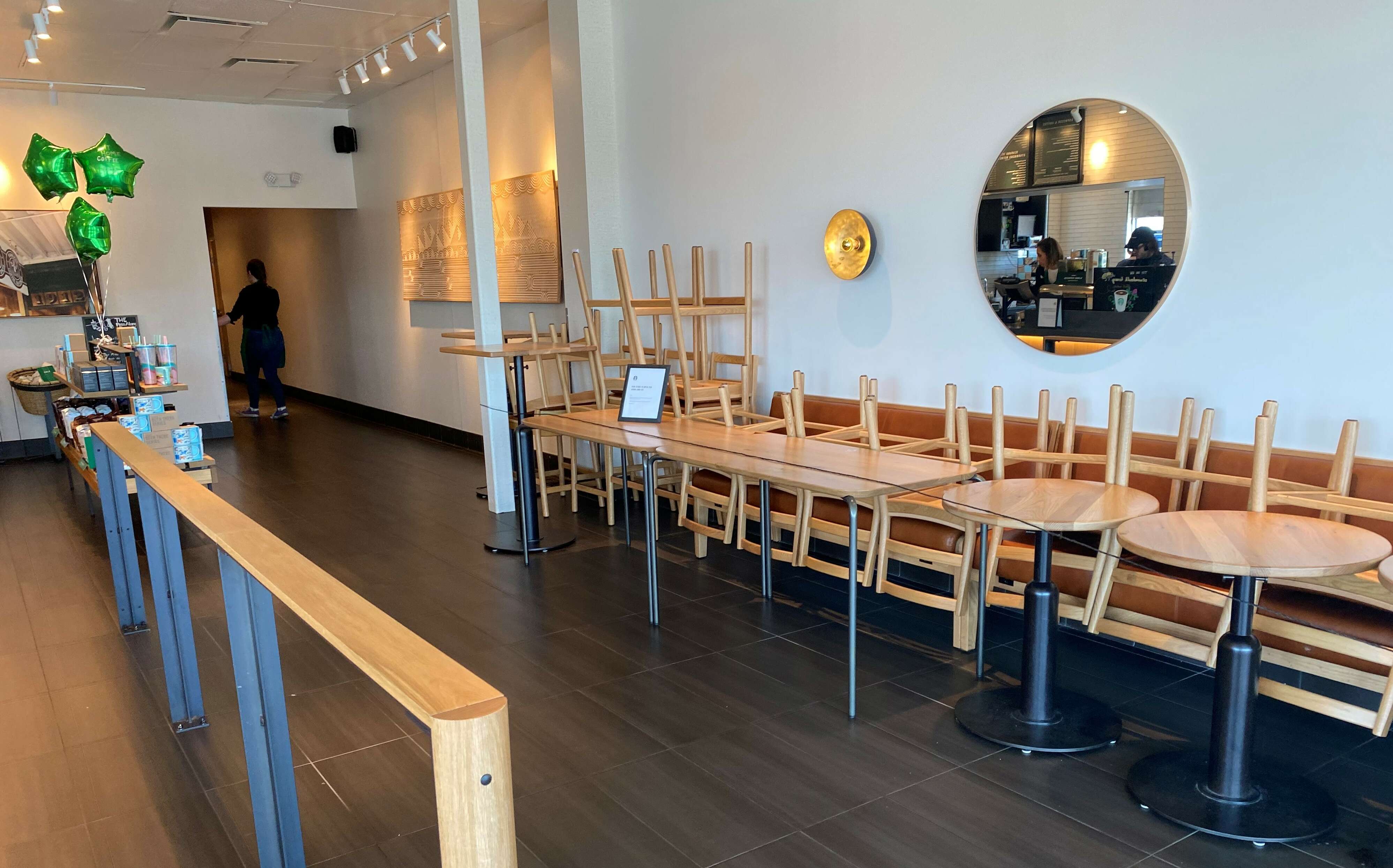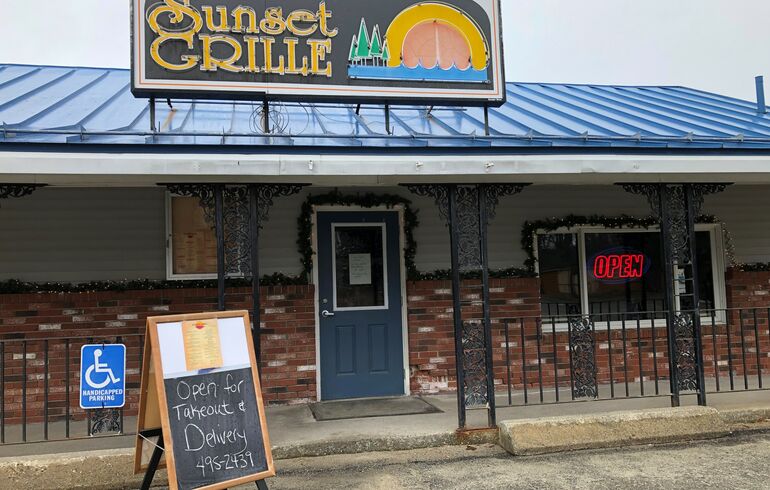
Processing Your Payment
Please do not leave this page until complete. This can take a few moments.
- News
-
Editions
View Digital Editions
Biweekly Issues
- December 1, 2025
- Nov. 17, 2025
- November 03, 2025
- October 20, 2025
- October 6, 2025
- September 22, 2025
- + More
Special Editions
- Lists
- Viewpoints
-
Our Events
Event Info
Award Honorees
- Calendar
- Biz Marketplace
Chambers look to support economy after Mills' order halts dining in, gatherings
 Photo / Maureen Milliken
Restaurants across Maine are offering takeout and delivery after Gov. Janet Mills executive order Wednesday halting dine-in service for 14 days.
Photo / Maureen Milliken
Restaurants across Maine are offering takeout and delivery after Gov. Janet Mills executive order Wednesday halting dine-in service for 14 days.
More Information
Chambers of commerce across the state are jumping in to find ways to help keep local economies afloat across Maine following Gov. Janet Mills' executive order Wednesday mandating that all restaurants and bars statewide close to dine-in customers for the next two weeks.
Mills Wednesday mandated that all restaurants and bars statewide close to dine-in customers effective that day at 6 p.m. and until midnight March 31. Take-out, delivery, and drive-through options can continue. She also prohibited gatherings of more than 10 people until further notice and strongly urged "nonessential public-facing businesses," such as gyms, hair salons, theaters, casinos and shopping malls, to close for the next two weeks to minimize public gatherings.
The order is a way to "significantly strengthen social distancing measures in Maine," Mills said. Social distancing is considered one of the most effective methods to help mitigate the spread of COVID-19, health officials have said.
“I do not take these steps lightly," Mills said at a news conference. "Maine’s small businesses and their workers are the backbone of our economy, and I understand that these actions will not only impact them, they will also disrupt the lives of Maine people." But she said "aggressive action" was needed to stop the spread of the virus.
The order is already having a huge impact on businesses and communities across the state, and that's expected to increase.

Chambers offering resources, help
Across the state, Maine chambers of commerce and other groups supporting and advocating for businesses have responded.
"Chambers are hearing serious concerns from Maine employers about their ability to endure the pandemic," Maine State Chamber of Commerce President Dana Connors said in a news release Wednesday after Mills' announcement.
“It is important all Maine employers know assistance and resources are coming together to help them weather this unprecedented pandemic,” Connors said. “We are all in this together, we are stronger together, and the chamber of commerce community is committed to helping find ways to mitigate the effects of the COVID-19 pandemic on businesses, their employees and consumers, and Maine’s economy.”
The state chamber said that local and regional chambers are prioritizing public health, but also promoting ways every Mainer can help businesses, especially small businesses, continue to sell goods and services during the pandemic and its associated curfews and restrictions.
Chambers across the state are urging individuals to support local and small businesses in a variety of ways, including:
• Using delivery, take-out and curbside services;
• Paying vendors, such as caterers, now for events that have been postponed because of the virus;
• Buying gift cards to retailers, restaurants, shops, and movie, concert and theaters;
• Buying class passes for fitness studios, gyms and more;
• Buying merchandise online from retailers, breweries, restaurants, and others.
Many of the chambers are asking members for feedback on how best to support them, and also offering daily reports to those on their email lists that offer resources, tips and more.
“Every community’s needs are different, and we are reaching out to area businesses to help identify their needs and seek solutions,” said Deb Neuman, president and CEO of the Bangor Region Chamber of Commerce. “One thing we all share is our commitment to supporting one another with a sense of optimism and confidence that despite the hits Maine businesses are taking now, we will make it through to the other side of this pandemic.”
Many chambers have already set up programs to help in a variety of ways.
The Kennebec Valley Chamber of Commerce Wednesday created a Facebook page for bars and restaurants and is asking owners to post their takeout and delivery options. It's also asking areas residents to not only patronize restaurants, but offer reviews that will help boost service.
At least a dozen restaurants had posted since the page was created Wednesday afternoon, and another member of the group created an interactive map on a new webpage, outsidepickup.com, where businesses can show they're offering takeout, and where they're located.
The Lewiston Auburn Metro Chamber of Commerce is offering 90-day forbearance on loans it administers to small businesses. The chamber's Economic Growth Department lends money to local businesses, partnering with Norway Savings Bank and the Finance Authority of Maine. Currently, 29 local businesses have loans through the program.
With 98% of Maine’s employees qualifying as working for a small business, it's "clear that small businesses are the backbone to our local economy, and everyone has a vested interest in ensuring the longevity of each business," the chamber said in a news release.
It's offering the forbearance, as well as modifying loans and ensuring clients have the most current information on other Small Business Association disaster loans, as well as federal, state and local programs.
Impact domino effect
Businesses are experiencing a variety of effects from COVID-19 mitigation measures.
While take-out and pickup are being urged, Hannaford supermarkets has temporarily halted its Hannaford To Go service at 26 stores in Maine. With To Go, customers order and pay online, an employee picks out the groceries, and the customer picks them up at the store.
"We have paused the Hannaford To Go online shopping service temporarily to redirect those associates to restocking store shelves as quickly as possible for all customers," the Scarborough-based company said. "This action is one of many difficult decisions being made, amid unprecedented demand for product, to focus associates on replenishing items in our supermarkets as quickly as possible and supporting customers throughout the store in meeting their most-important needs."
Simon Property Group [NYSE: SPG], which owns 204 malls across the country, including the Kittery Outlet, has closed its U.S. properties until March 29, it announced on its website. The announcement came after several states with Simon-owned malls announced restrictions on retail gatherings.
Smaller business are also feeling the pinch. For example, at Stata, a Portland business that sells Japanese cutlery and offers whetstone knife sharpening, business relies on the city's professional food industry.
"Business is way down, plain and simple," owner Evan Atwell told Mainebiz.
And even companies seeing an uptick in business are feeling the effects.
Hannaford is considering a purchase limit for high-demand items, like toilet paper as it struggles to keeps shelves stocked.
"We are working as quickly as possible to replenish specific high-demand items when a low inventory occurs," said Ericka Dodge, manager of external communications. "We are confident that Hannaford will continue to meet the needs of local communities. The food supply chain in the United States is healthy, so this is not a supply issue. It’s just that we are seeing unprecedented demand nationwide."
There are challenges to getting products delivered and on store shelves at a speed that matches the demand.
"As mentioned, we continue to work as quickly as possible to replenish specific high-demand items when a low inventory occurs, and, we’re working closely with our suppliers to provide our customers with the products they need," she said. "We’re also searching widely for new sources of supplies. It is important for all of us at this time to be mindful of other customers who also have needs. To that end, we encourage customers to purchase what they need and leave some for others."
State working on solutions
Heather Johnson, of the state Department of Economic and Community Development, said the state is continuing its work to find ways to support Maine businesses and workers.
“DECD, in partnership with other departments in Gov. Mills’ administration, is committed to finding solutions and to partnering with other entities that can offer support to ensure that there are resources available for businesses impacted by the changes in the market as a result of the coronavirus," Johnson said.
Mills Wednesday also signed into law an emergency bill granting her access to at least $11 million in state funding to respond to COVID-19 and an omnibus emergency bill expanding authorities of state and local officials to allow them greater flexibility to respond to the virus.
The package also temporarily revises eligibility for unemployment insurance to extend it to those who are out of work because of shutdowns or business modifications related to the virus. It waives the one-week waiting period for benefits and ensures that claims won't affect an employer’s experience rating.
It also establishes a consumer loan guarantee program through FAME, in partnership with financial institutions, to provide low- or no- interest loans for eligible people in Maine.
The bipartisan supplemental budget also provides $1 million to the Maine Centers for Disease Control and Prevention to support public health nurses and cover costs of lab tests and other response efforts not otherwise federally funded.
The Small Business Administration also is offering economic support loans to businesses to help them overcome any temporary loss of revenue because of COVID-19.
The executive order, in part:
Prohibits gatherings of more than 10 people statewide. Gatherings subject to this Order are those that are primarily social, personal, and discretionary events not work-related events. Such gatherings include, without limitation, community, civic, public, leisure, faith-based events; social clubs; sporting events with spectators; concerts, conventions, fundraisers, parades, fairs, and festivals; and any similar event or activity in a venue such as an auditorium, stadium, arena, large conference room, meeting hall, theater, gymnasium, fitness center or private club.
Closes dine-in facilities at all restaurants and bars statewide. All restaurants and bars shall close their dine-in facilities. Such businesses that offer carry-out, delivery, and drive-through food and beverage service may continue to do so but eating and drinking inside restaurants and bars is temporarily prohibited.
Says such businesses offering carry-out, delivery, and drive-through food and beverage should employ social distancing best practices and minimize gathering of customers. The Governor urges Maine people to continue to support our establishments by purchasing take-out meals or by buying gift cards or other measures of support.
Strongly urges non-essential public-facing businesses, such as gyms, hair salons, theatres, casinos, shopping malls, to close their doors for the next two weeks to minimize public gatherings.
Does not include businesses that provide essential services including, but not limited to: food processing, agriculture, industrial manufacturing, construction, trash collection, grocery and household goods (including convenience stores), home repair and hardware and auto repair, pharmacy and other medical facilities, biomedical and health care, child care, post offices and shipping outlets, insurance, banks, gas stations, laundromats, veterinary clinics and animal feed and supply stores, shipping stores, public transportation, and hotel and commercial lodging.
Although these businesses may remain open, Mills strongly urged Maine people to implement social distancing measures and to be thoughtful about the need to visit these businesses.
Other businesses, including but not limited to legal services, business and management consulting, professional services and insurance services, are encouraged to have employees work remotely. If that is not possible, Mills urges employees to implement social distancing measures.
State and federal help cited by Maine Chamber of Commerce
• The U.S. Small Business Administration has approved Mills’ request to provide disaster assistance to Maine small businesses. Businesses can apply, find more information, and download applications here. The deadline to apply for assistance is Dec. 16. Applicants may also call SBA’s Customer Service Center at 800-659-2955 or email disastercustomerservice@sba.gov for more information. Individuals who are deaf or hard-of-hearing may call 800-877-8339. Completed applications should be mailed to U.S. Small Business Administration, Processing and Disbursement Center, 14925 Kingsport Road, Fort Worth, TX 76155.
• Consumer loan guarantee program through the Finance Authority of Maine in partnership with financial institutions, to provide low- or no- interest loans for eligible people in Maine. Sole proprietors can now apply for FAME loans up to $5,000 with 3 chances to apply for a total of $15,000.
• Unemployment Insurance: State legislation was passed to make unemployment insurance system more flexible for both employees and employers. For employees: The usual one week waiting period for eligibility will be waived in the event of a Covid-19 related layoff. For employers: Layoffs associated with COVID-19 will not count against an employer’s experience rating for UI tax purposes.
• At the federal level, Congress and the Trump administration are taking actions to blunt the impact of the pandemic on the nation’s economy. Rescue proposals are nearing a trillion dollars in aid. Among federal legislation being considered is U.S. Sen. Susan Collins’ “Keeping Workers Paid and Employed Act,” which would provide cash-flow assistance quickly to employers. This cash-flow assistance could be as much as the employer needs to stay in operation without lay-offs. Funds are required to be used to pay employees.
Mainebiz web partners
Related Content

The Giving Guide
The Giving Guide helps nonprofits have the opportunity to showcase and differentiate their organizations so that businesses better understand how they can contribute to a nonprofit’s mission and work.
Learn More
Work for ME
Work for ME is a workforce development tool to help Maine’s employers target Maine’s emerging workforce. Work for ME highlights each industry, its impact on Maine’s economy, the jobs available to entry-level workers, the training and education needed to get a career started.
Learn More
Groundbreaking Maine
Whether you’re a developer, financer, architect, or industry enthusiast, Groundbreaking Maine is crafted to be your go-to source for valuable insights in Maine’s real estate and construction community.
Learn more-
The Giving Guide
The Giving Guide helps nonprofits have the opportunity to showcase and differentiate their organizations so that businesses better understand how they can contribute to a nonprofit’s mission and work.
-
Work for ME
Work for ME is a workforce development tool to help Maine’s employers target Maine’s emerging workforce. Work for ME highlights each industry, its impact on Maine’s economy, the jobs available to entry-level workers, the training and education needed to get a career started.
-
Groundbreaking Maine
Whether you’re a developer, financer, architect, or industry enthusiast, Groundbreaking Maine is crafted to be your go-to source for valuable insights in Maine’s real estate and construction community.
ABOUT
NEW ENGLAND BUSINESS MEDIA SITES
No articles left
Get access now
In order to use this feature, we need some information from you. You can also login or register for a free account.
By clicking submit you are agreeing to our cookie usage and Privacy Policy
Already have an account? Login
Already have an account? Login
Want to create an account? Register
Get access now
In order to use this feature, we need some information from you. You can also login or register for a free account.
By clicking submit you are agreeing to our cookie usage and Privacy Policy
Already have an account? Login
Already have an account? Login
Want to create an account? Register











0 Comments